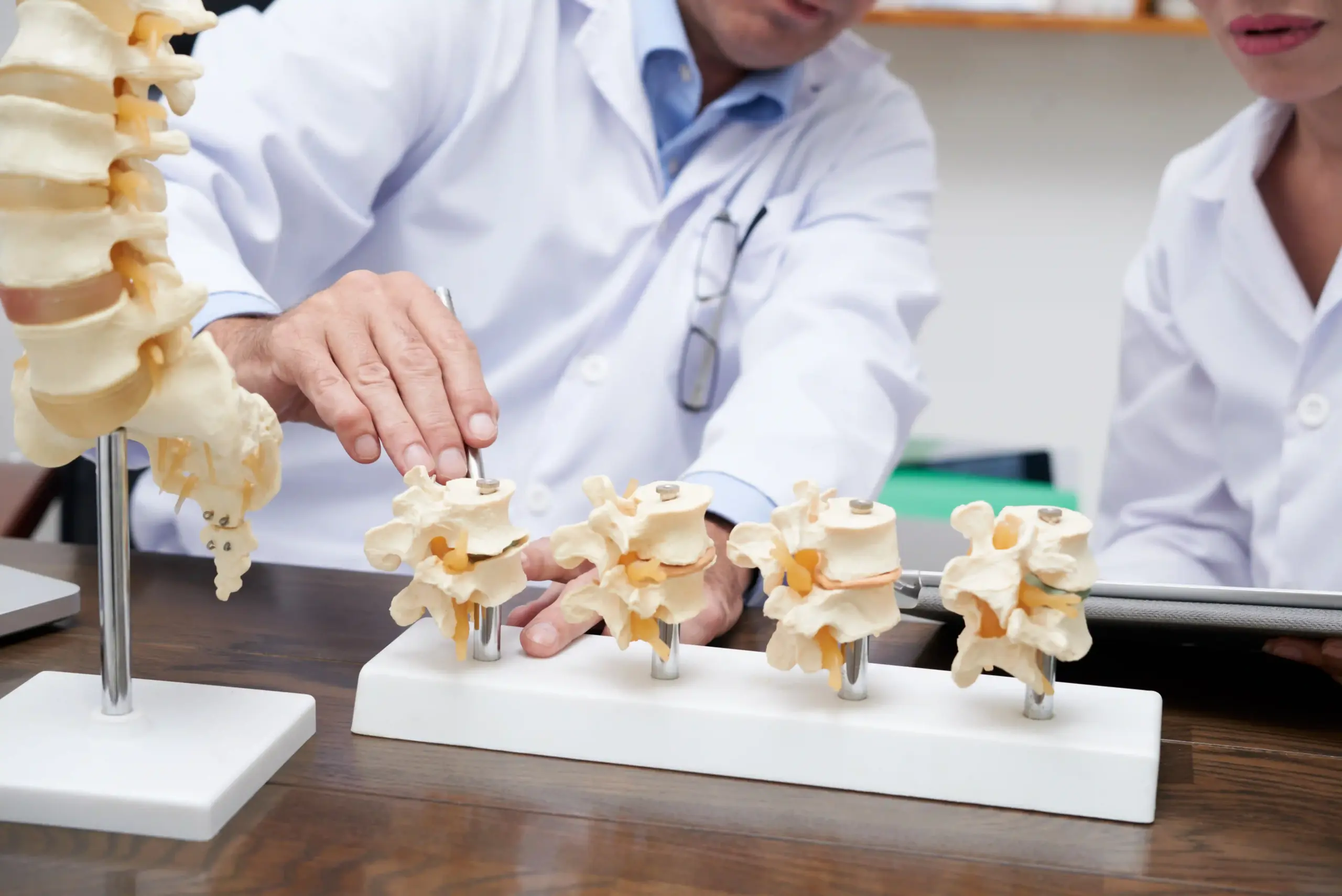Minimally Invasive Spine Surgery Ensures Quick Recovery and Lasting Relief
Experience pain-free healing with advanced minimally invasive spine surgery techniques.

Minimally Invasive Spine Surgery
Back pain isn’t just a discomfort for many, it’s a life disruptor. When traditional treatments like physiotherapy or medications no longer help, surgery may become the next step. But here’s the good news: you don’t always need a large incision or a long hospital stay. At VS Hospitals, Chennai, Minimally Invasive Spine Surgery (MISS) offers a modern, precise, and faster recovery alternative to conventional open spine surgery.
MISS uses small incisions, advanced imaging, and tubular retractors to access and treat spinal problems with minimal muscle disruption. The result? Less pain, fewer scars, quicker recovery, and a faster return to everyday life.

Early Detection Saves Lives
Early detection and treatment are crucial for improving the chances of survival. If you notice any concerning symptoms, consult a healthcare provider immediately.
Signs and Symptoms
Persistent Back or Neck Pain
Persistent back or neck pain lasting more than six weeks
Radiating Pain
Radiating pain down the arms or legs (sciatica)
Numbness
Tingling, weakness, or numbness in limbs
Difficulty Walking
Difficulty walking or balancing
Severe Pain
Severe pain after bending, twisting, or lifting
bladder
The tiny incisions not only contribute to a faster healing time but also result in a more aesthetically pleasing outcome, with less scarring.
Blood in Urine
Hematuria - pink, red, or dark urine, the most common symptom
Frequent Urination
Feeling the need to urinate frequently, even when bladder is not full
Painful Urination
Experiencing pain or burning sensation while urinating
Back or Pelvic Pain
Pain that occurs as the cancer grows and spreads
Unexplained Weight Loss
Significant weight loss not related to diet or exercise
Fatigue
Feeling unusually tired or weak without a clear cause
Meet Our Expert Minimally Invasive Spine Surgery
Risk Factors
Smoking
Smoking is one of the leading causes of bladder cancer. Chemicals in tobacco smoke can damage the lining of the bladder, increasing the risk.

Gender
Men are at a higher risk of developing bladder cancer than women.

Chronic Bladder Infections or Inflammation
Conditions such as bladder infections and long-term bladder inflammation can increase the risk.

Exposure to Chemicals
Prolonged exposure to certain chemicals, especially those used in the dye industry, rubber production, and chemical manufacturing, increases the risk.

Ageing
Natural spinal degeneration over time

Occupational strain
Heavy lifting, long sitting hours, or poor posture

Lifestyle
Obesity, lack of exercise, and smoking weaken spinal health

Injuries
Accidents or sports-related spinal trauma

Genetics
Family history of spinal disorders

Medical conditions
Osteoporosis, arthritis, or previous spine surgeries

Minimally Invasive Spine Surgery
Diet and Nutrition
Prevention
Diagnosis
Key Services
Key Facilities
Your spine’s health depends as much on your diet as on your posture. VS Hospitals emphasizes nutrition as a part of holistic spine care.
Recommended foods include:
- Calcium-rich foods: Milk, yogurt, leafy greens to strengthen bones
- Vitamin D sources: Sunlight exposure, fatty fish, eggs for bone density
- Anti-inflammatory foods: Berries, turmeric, green tea to reduce inflammation
- Lean proteins: Chicken, lentils, tofu for muscle repair and healing
- Hydration: Adequate water intake to keep spinal discs hydrated
- Avoid: Processed foods, excessive caffeine, sugary drinks, and alcohol — they worsen inflammation and bone loss.
Preventing spine problems is always better than fixing them later. At VS Hospitals, prevention is integrated into every patient’s recovery plan.
Smart prevention tips:
- Maintain correct posture while sitting or working
- Exercise regularly focus on core strengthening and flexibility
- Avoid smoking, which restricts blood flow to spinal tissues
- Use ergonomically designed chairs and sleeping surfaces
- Lift objects using your knees, not your back
- Manage stress chronic tension can tighten muscles and worsen pain
These small lifestyle changes significantly reduce the chances of recurring spinal issues.
Accurate diagnosis is the foundation of successful spine treatment. VS Hospitals combines advanced diagnostic technology with the expertise of top spine specialists to pinpoint the root cause.
Diagnostic methods include:
- MRI Scans: To visualize soft tissues, nerves, and discs
- CT Scans: For detailed bone and joint evaluation
- X-rays: To assess structural deformities or alignment issues
- Nerve conduction studies: To detect nerve compression or damage
- Physical and neurological examination: For assessing reflexes, strength, and motion
This evidence-based approach ensures that every patient gets a personalized and effective surgical plan.
VS Hospitals in Chennai is a recognized leader in advanced spinal care, offering a full spectrum of minimally invasive treatments under one roof.
Core MISS procedures include:
- Microdiscectomy: For herniated or slipped discs
- Laminectomy: To relieve spinal canal pressure
- Spinal fusion (MIS technique): To stabilize the spine with minimal muscle disruption
- Endoscopic spine surgery: For targeted decompression using small ports and cameras
- Vertebroplasty & Kyphoplasty: For compression fractures
- Decompression surgeries: For sciatica and nerve compression relief
When it comes to spinal health, infrastructure matters as much as expertise. VS Hospitals is equipped with world-class facilities designed to deliver precision-driven, patient-centered care.
State of the art facilities include:
- Advanced Operating Theatres: Dedicated modular spine surgery suites with laminar airflow and infection control systems
- 3D Imaging & Navigation Systems: For accurate surgical guidance
- Robotic-assisted Spine Systems: For precision and safety during complex surgeries
- Dedicated Spine ICU: For continuous post-surgical monitoring and recovery
- Rehabilitation and Physiotherapy Unit: Personalized recovery programs to restore strength and mobility
- Multidisciplinary Spine Team: Orthopaedic surgeons, neurosurgeons, pain specialists, and physiotherapists working together for integrated care
VS Hospitals’ patient-first philosophy ensures comfort, safety, and results that go beyond surgery focusing on total recovery and long-term spine health.
Top Medical Facilities at Our Multispeciality Hospital – Here’s What Makes Us Different!
Ready to Begin Your Minimally Invasive Spine Surgery Journey?
Learn More About Minimally Invasive Spine Surgery
Frequently Asked Questions
Minimally invasive spine surgery offers multiple benefits, including smaller incisions, reduced muscle and tissue damage, faster recovery, less blood loss, and lower risks of infection. These advantages lead to a quicker return to normal activities and fewer complications compared to traditional spine surgery.
Recovery time is significantly shorter than with traditional open surgery. Most patients can resume light activities within 1-2 weeks, and full recovery may take 3-6 months. However, pain relief is often immediate, and many patients experience substantial improvement within a few weeks.
Like any surgical procedure, minimally invasive spine surgery carries some risks, including nerve injury, infection, bleeding, and recurrence of pain. However, the risks are generally lower than with traditional open surgery due to the smaller incisions and reduced tissue disruption.
